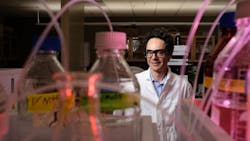The University of Arizona, University of Southern California and University of Nevada have each received $4 million in grants to launch the Consortium for Potable Water Reuse.
The consortium will help to improve water security and water reuse methods in the arid southwestern United States.
The consortium will bring together experts in diverse fields to advance water treatment technologies, make water reuse systems more efficient and drive sustainable practices. The UArizona team will focus on using automation and decentralization to improve potable water reuse deployment and adoption.
The funding agency is the U.S. Army Engineer Research and Development Center's Construction Engineering Research Laboratory. The initial grants are for phase one of the consortium’s project. Phase two will award an additional $3 million in funding, with the possibility of another $3 million for phase three.
The Colorado River, which provides drinking water to tens of millions of people and irrigation water to more than 5 million acres of farmland, has dropped by one-third in recent years. Arizona recently limited housing construction in the Phoenix area based on projections that groundwater will be unable to meet growing demand.
"We are the leading schools that do research on water reuse in the Southwest, which is where alternative water sources and potable use is needed," said grant principal investigator Andrea Achilli, a UArizona associate professor of chemical and environmental engineering and researcher at the university's Water and Energy Sustainable Technology Center. "What we want to do is to allow for self-sufficiency and resiliency in the Southwest."
Achilli believes decentralized water treatment systems, which manage water at the neighborhood level — or, in densely populated areas, even the building level — are key to better enabling water reuse. Some cities and large companies, such as Intel, are already experimenting with this. Achilli draws a comparison to the growing popularity of home solar panels.
"Water is messy, but I think the way we are going to deal with water is the same way we are starting to deal with other major systems, like the electric grid," he said. "If we really want to enable water reuse, we need to transform the systems from centralized – like we've been doing for the past 100 years – into decentralized, autonomous systems."
Avoiding moving water back and forth between a neighborhood and a treatment plant saves energy, time and money. It also allows people to be more familiar with their water sources; for example, residential systems will only have residential pollutants, Achilli said.
The role of automation
In order for water treatment to be managed at the neighborhood level, Achilli said, it needs to be simple yet sophisticated. Right now, it's not. In fact, Achilli said, much of the software used in water management systems is outdated – and essentially none of it operates autonomously.
High-end systems, like the one used by Achilli and his team at the WEST Center, require a team of experts with a unique set of skills in experiments, programming, coding and analyzing systems.
Someday, autonomized decentralization could allow for in-house water reuse systems in individual houses or apartments. Achilli compares the idea of these in-house systems to washing machines, which anyone can easily operate at home without specialized skills.
"Nobody is an expert in washing machine technologies," he said. "We just use it, right? That's the level where we need to get to in order to really have decentralized systems."



